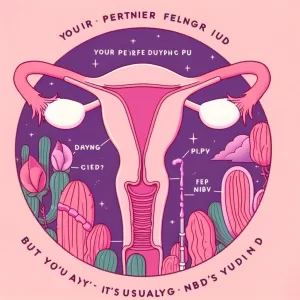Qu'est-ce que le syndrome prémenstruel ?
[wp_show_posts id=””]
**Q: What is Premenstrual Syndrome (PMS)?**
**A:** Premenstrual Syndrome (PMS) is a common condition that affects physical, emotional, and behavioral changes in individuals during the luteal phase of the menstrual cycle, which occurs approximately 7-10 days before the onset of menstruation. These symptoms can range in severity and may last for a few days or up to two weeks.
**Q: Who is Affected by PMS?**
**A:** PMS is estimated to affect up to 90% of women during their reproductive years. The severity of symptoms can vary significantly, with around 20-30% of women experiencing moderate to severe symptoms that impact daily functioning.
**Q: What Causes PMS?**
**A:** The exact cause of PMS is not fully understood, but it is believed to be linked to fluctuations in hormone levels during the menstrual cycle, particularly estrogen and progesterone. These hormonal changes can affect the brain and body, leading to a variety of symptoms.
**Q: What are the Symptoms of PMS?**
**A:** The symptoms of PMS can be diverse and vary from individual to individual. Some common physical symptoms include:
* Breast tenderness
* Bloating
* Headaches
* Fatigue
* Acne breakouts
* Cramps
* Food cravings
Emotional and behavioral symptoms may include:
* Irritability
* Mood swings
* Anxiety
* Depression
* Difficulty concentrating
* Social withdrawal
**Q: How is PMS Diagnosed?**
**A:** PMS is typically diagnosed based on the individual’s symptoms and their timing in relation to the menstrual cycle. A healthcare professional may ask questions about symptoms, perform a physical exam, and review menstrual records.
**Q: What are the Treatment Options for PMS?**
**A:** Treatment for PMS aims to relieve symptoms and improve quality of life. Some common approaches include:
* Lifestyle changes: Regular exercise, healthy diet, and stress management techniques can help reduce symptoms.
* Over-the-counter pain relievers: Non-steroidal anti-inflammatory drugs (NSAIDs) can help relieve pain and inflammation.
* Hormonal therapy: Birth control pills, patches, or rings can regulate hormone levels and reduce PMS symptoms.
* Selective serotonin reuptake inhibitors (SSRIs): These antidepressants may help alleviate emotional symptoms such as anxiety and depression.
**Q: When Should I Seek Professional Help for PMS?**
**A:** Seek professional help if:
* PMS symptoms are severe and interfere with daily activities
* Symptoms are new or worsen over time
* Emotional symptoms are persistent or overwhelming
* Over-the-counter remedies do not effectively relieve symptoms
**Q: What is Premenstrual Syndrome (PMS)?**
**A:** Premenstrual Syndrome (PMS) is a common condition that affects physical, emotional, and behavioral changes in individuals during the luteal phase of the menstrual cycle, which occurs approximately 7-10 days before the onset of menstruation. These symptoms can range in severity and may last for a few days or up to two weeks.
**Q: Who is Affected by PMS?**
**A:** PMS is estimated to affect up to 90% of women during their reproductive years. The severity of symptoms can vary significantly, with around 20-30% of women experiencing moderate to severe symptoms that impact daily functioning.
**Q: What Causes PMS?**
**A:** The exact cause of PMS is not fully understood, but it is believed to be linked to fluctuations in hormone levels during the menstrual cycle, particularly estrogen and progesterone. These hormonal changes can affect the brain and body, leading to a variety of symptoms.
**Q: What are the Symptoms of PMS?**
**A:** The symptoms of PMS can be diverse and vary from individual to individual. Some common physical symptoms include:
* Breast tenderness
* Bloating
* Headaches
* Fatigue
* Acne breakouts
* Cramps
* Food cravings
Emotional and behavioral symptoms may include:
* Irritability
* Mood swings
* Anxiety
* Depression
* Difficulty concentrating
* Social withdrawal
**Q: How is PMS Diagnosed?**
**A:** PMS is typically diagnosed based on the individual’s symptoms and their timing in relation to the menstrual cycle. A healthcare professional may ask questions about symptoms, perform a physical exam, and review menstrual records.
**Q: What are the Treatment Options for PMS?**
**A:** Treatment for PMS aims to relieve symptoms and improve quality of life. Some common approaches include:
* Lifestyle changes: Regular exercise, healthy diet, and stress management techniques can help reduce symptoms.
* Over-the-counter pain relievers: Non-steroidal anti-inflammatory drugs (NSAIDs) can help relieve pain and inflammation.
* Hormonal therapy: Birth control pills, patches, or rings can regulate hormone levels and reduce PMS symptoms.
* Selective serotonin reuptake inhibitors (SSRIs): These antidepressants may help alleviate emotional symptoms such as anxiety and depression.
**Q: When Should I Seek Professional Help for PMS?**
**A:** Seek professional help if:
* PMS symptoms are severe and interfere with daily activities
* Symptoms are new or worsen over time
* Emotional symptoms are persistent or overwhelming
* Over-the-counter remedies do not effectively relieve symptoms
Un commentaire
Laisser un commentaire
Articles populaires








#PremenstrualSyndrome #PMS